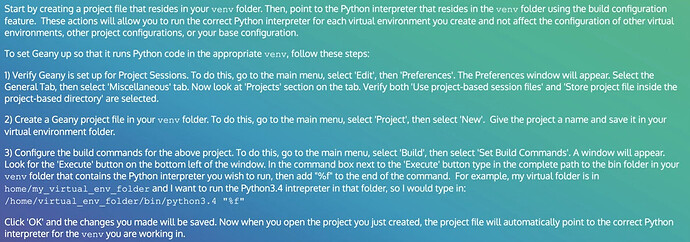Yes I have Libreoffice snap installed.
Basically I an trying to determine correlation coefficients for two columns of numbers.
This is the error I am getting:
<class ‘ModuleNotFoundError’>: No module named ‘pyexcel_ods’
File "/snap/libreoffice/315/lib/libreoffice/program/pythonscript.py", line 1058, in getScript
mod = self.provCtx.getModuleByUrl( fileUri )
File "/snap/libreoffice/315/lib/libreoffice/program/pythonscript.py", line 495, in getModuleByUrl
exec(code, entry.module.__dict__)
File "/home/yodap/snap/libreoffice/315/.config/libreoffice/4/user/Scripts/python/MyPythonLibrary/CorrCoeff.py", line 2, in <module>
import pyexcel_ods
File "/snap/libreoffice/315/lib/libreoffice/program/uno.py", line 346, in _uno_import
return _builtin_import(name, *optargs, **kwargs)
Here is my code:
import pyexcel_ods
import pandas as pd
def calculate_correlation(data, data_columns, comparison_column):
# Extract relevant columns
selected_data = data[data_columns + [comparison_column]]
# Calculate correlation
correlation = selected_data.corr()[comparison_column]
return correlation
def write_correlation_to_ods(correlation, output_file, cell):
# Write correlation coefficient to the specified cell in the .ods file
sheet = pyexcel_ods.get_sheet(file_name=output_file)
sheet[cell] = correlation
sheet.save_as(output_file)
I have run this through ChapGPT but it is not coming up with much in the way of answers.
Here is some more output from the command line:
yodap@yodap-NUC11:~$ pip list
Package Version
--------------------- -------------------
argcomplete 2.0.0
attrs 23.1.0
Babel 2.10.3
bcrypt 3.2.2
beautifulsoup4 4.12.2
blinker 1.6.2
Brlapi 0.8.4
certifi 2022.9.24
chardet 5.1.0
click 8.1.6
cloud-init 23.4.4
colorama 0.4.6
colorlog 6.7.0
command-not-found 0.3
configobj 5.0.8
cryptography 38.0.4
cupshelpers 1.0
dbus-python 1.3.2
defer 1.0.6
defusedxml 0.7.1
distro 1.8.0
distro-info 1.5+ubuntu0.23.10.1
dnspython 2.4.1
duplicity 1.2.2
fasteners 0.17.3
freetype-py 2.4.0
future 0.18.2
ghp-import 2.1.0
gpg 1.18.0
html5lib 1.1
httplib2 0.20.4
idna 3.3
importlib-metadata 4.12.0
iniconfig 1.1.1
jaraco.classes 3.2.1
jeepney 0.8.0
Jinja2 3.1.2
joblib 1.2.0
jsonpatch 1.32
jsonpointer 2.0
jsonschema 4.10.3
keyring 24.2.0
language-selector 0.1
launchpadlib 1.11.0
lazr.restfulclient 0.14.5
lazr.uri 1.0.6
livereload 2.6.3
lml 0.1.0
lockfile 0.12.2
louis 3.26.0
lunr 0.6.2
lxml 4.9.3
Mako 1.2.4.dev0
Markdown 3.4.4
markdown-it-py 3.0.0
MarkupSafe 2.1.3
mdurl 0.1.2
mergedeep 1.3.4
mkdocs 1.4.2
monotonic 1.6
more-itertools 10.1.0
netifaces 0.11.0
nltk 3.8.1
notify2 0.3
numpy 1.24.2
oauthlib 3.2.2
odfpy 1.4.1
olefile 0.46
packaging 23.1
paramiko 2.12.0
pexpect 4.8.0
Pillow 10.0.0
pip 23.2
pipx 1.2.0
pluggy 1.2.0
psutil 5.9.4
ptyprocess 0.7.0
pycairo 1.24.0
pycups 2.0.1
pyexcel-io 0.6.6
pyexcel-ods 0.6.0
Pygments 2.15.1
PyGObject 3.46.0
pyinotify 0.9.6
PyJWT 2.7.0
PyNaCl 1.5.0
pyparsing 3.1.0
pyrsistent 0.18.1
pyserial 3.5
pytest 7.4.0
python-apt 2.6.0+ubuntu1
python-dateutil 2.8.2
python-debian 0.1.49+ubuntu2
pytz 2023.3
pyxdg 0.28
PyYAML 6.0.1
pyyaml_env_tag 0.1
regex 2022.10.31
reportlab 4.0.4
requests 2.31.0
requests-toolbelt 1.0.0
rich 13.3.1
rlPyCairo 0.3.0
SecretStorage 3.3.3
setuptools 68.1.2
Shredder 2.9.0 Odd Olm
simplejson 3.19.1
six 1.16.0
soupsieve 2.4.1
systemd-python 235
tornado 6.3.2
tqdm 4.64.1
ubuntu-drivers-common 0.0.0
ubuntu-pro-client 8001
ufw 0.36.2
unattended-upgrades 0.1
urllib3 1.26.16
usb-creator 0.3.16
userpath 1.9.0
wadllib 1.3.6
watchdog 3.0.0
webencodings 0.5.1
wheel 0.41.0
xdg 5
xkit 0.0.0
xlrd 1.2.0
zim 0.75.1
zipp 1.0.0
yodap@yodap-NUC11:~$ pipx list
venvs are in /home/yodap/.local/pipx/venvs
apps are exposed on your $PATH at /home/yodap/.local/bin
package pyexcel-ods 0.6.0, installed using Python 3.11.6
- csv2ods
- mailodf
- odf2mht
- odf2xhtml
- odf2xml
- odfimgimport
- odflint
- odfmeta
- odfoutline
- odfuserfield
- xml2odf
yodap@yodap-NUC11:~$ /usr/bin/python3 -m pipx install pyexcel-ods 'pyexcel-ods' already seems to be installed. Not modifying existing installation in '/home/yodap/.local/pipx/venvs/pyexcel-ods'. Pass '--force' to force installation. yodap@yodap-NUC11:~$ /usr/bin/python3.11 -m pipx install pyexcel-ods 'pyexcel-ods' already seems to be installed. Not modifying existing installation in '/home/yodap/.local/pipx/venvs/pyexcel-ods'. Pass '--force' to force installation. yodap@yodap-NUC11:~$ /usr/bin/python3.11 -m pipx install pyexcel_ods 'pyexcel-ods' already seems to be installed. Not modifying existing installation in '/home/yodap/.local/pipx/venvs/pyexcel-ods'. Pass '--force' to force installation. yodap@yodap-NUC11:~$ /usr/bin/python3 -m pipx install pyexcel_ods 'pyexcel-ods' already seems to be installed. Not modifying existing installation in '/home/yodap/.local/pipx/venvs/pyexcel-ods'. Pass '--force' to force installation. yodap@yodap-NUC11:~$
I have tried pyexcel-ods and pyexcel_ods....and while both are found...they never get used in the script as they cannot be found by it.
I think the problem is (as alluded to earlier by Wanderer) that I recently changed over from Libreoffice 7. something to the snap version 24.2.2.2....I seem to have totally lost the plot. Where am I going wrong? All help much appreciated!

